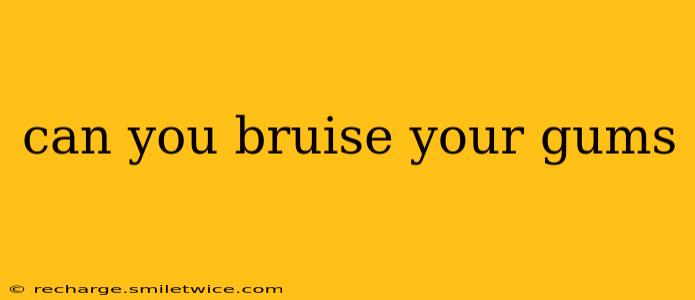Can You Bruise Your Gums?
Yes, you absolutely can bruise your gums. While not as common as bruising skin, gum bruising is a possibility and can manifest in several ways. Unlike skin bruises, which are typically visible discolorations due to broken blood vessels under the surface, gum bruising might not always present with the same obvious visual cues. Instead, the symptoms can be more subtle, yet still indicative of underlying trauma.
What Causes Bruised Gums?
Several factors can lead to bruised or injured gums:
-
Trauma: This is the most common cause. Hard brushing, accidental biting, dental procedures (like extractions or deep cleaning), and even vigorous flossing can all cause trauma leading to gum bruising. Improper use of dental tools, like overly forceful use of a Waterpik, can also contribute.
-
Poor Oral Hygiene: Neglecting oral hygiene can lead to gum disease (gingivitis or periodontitis). Inflamed and infected gums are more susceptible to injury and bruising.
-
Certain Medical Conditions: Some medical conditions can increase the risk of gum bleeding and bruising. These include bleeding disorders like hemophilia, vitamin deficiencies (particularly vitamin C and K), and certain medications that thin the blood.
-
Aggressive Teeth Grinding (Bruxism): Habitual teeth grinding can put significant pressure on the gums, potentially leading to bruising or other injuries over time.
What are the Symptoms of Bruised Gums?
The symptoms of a gum bruise can vary depending on the severity of the injury. They may include:
- Pain: A dull ache or sharp pain in the affected area is common. The pain may worsen with chewing or touching.
- Swelling: The gums may appear swollen and inflamed.
- Discoloration: While not always present, some bruising may lead to a darkened area on the gums, ranging from dark red to purplish-blue. This discoloration may be subtle and difficult to detect.
- Bleeding: Bleeding gums are a frequent symptom, especially if the injury is severe.
How Long Does it Take for Bruised Gums to Heal?
Healing time depends on the severity of the bruise. Minor bruising from accidental biting or slightly too vigorous brushing may heal within a few days. More significant injuries from dental procedures or underlying medical conditions may take longer to heal, potentially requiring professional dental care.
What Should I Do if I Think I've Bruised My Gums?
For minor injuries, gentle rinsing with warm salt water several times a day can help promote healing and reduce inflammation. Avoid brushing the affected area too forcefully and use a soft-bristled toothbrush. Over-the-counter pain relievers, such as ibuprofen, can help manage pain and swelling.
However, if you experience severe pain, excessive bleeding, significant swelling, or if the symptoms persist for more than a week, it's crucial to consult a dentist. They can properly assess the injury, rule out any underlying medical conditions, and provide appropriate treatment.
Can Bruised Gums Lead to More Serious Problems?
If left untreated, severe gum bruising or repeated injuries can contribute to gum disease. Gum disease can lead to tooth loss, infection, and other oral health complications. Therefore, prompt attention to any gum injury is essential to maintain good oral health.
What are some ways to prevent bruised gums?
Preventing gum bruising primarily involves practicing good oral hygiene and avoiding trauma to the gums. This includes:
- Gentle Brushing: Use a soft-bristled toothbrush and brush gently with short, back-and-forth strokes.
- Proper Flossing Technique: Use proper flossing techniques to avoid injuring your gums.
- Regular Dental Checkups: Schedule regular checkups and cleanings with your dentist to catch and address potential problems early.
- Stress Management: For bruxism (teeth grinding), stress management techniques like yoga or meditation can help reduce the habit. A dentist can also provide a mouthguard to protect your teeth and gums.
- A Balanced Diet: Ensure you are consuming enough Vitamin C and K to promote healthy gums and tissue healing.
By following these preventative measures and seeking professional help when needed, you can significantly reduce your risk of gum bruising and maintain optimal oral health. Remember, your gums are a vital part of your overall health, so take care of them!
